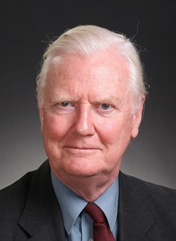Previous speakers and artists
| |
 |
|
September 29 - October 2, 2014
Conflict, cooperation
and the common good
Prof. Sir James A. Mirrlees
|
|
|
Keynote Speaker
Prof. Sir James A. Mirrlees received the Nobel Prize for Economics in 1996 for his fundamental contributions to the economic theory of incentives under asymmetric information. His research centered on situations in which economic information is asymmetrical or incomplete, determining the extent to which they should affect the optimal rate of saving in an economy. Among other results, his work demonstrated the principals of "moral hazard" and "optimal income taxation", a methodology that has since become the standard in the field.
Born in Scotland in 1936, James Mirrlees obtained his first and second degrees in Mathematics from the University of Edinburgh and the University of Cambridge and his PhD in Economics from Cambridge in 1963. He was Edgeworth Professor of Economics and Fellow of Nuffield College in Oxford from 1968 to 1995 and after 1995 Professor of Political Economy at Cambridge. Since 2002 he has been Distinguished Professor-at-Large at The Chinese University of Hong Kong, and in 2009 he became Master of Morningside College, established in The Chinese University of Hong Kong.
Sir James has also held Visiting Professorships at MIT, UC Berkeley, Yale, the University of Melbourne and Peking University. He was President of the Royal Economic Society from 1989 to 1992 and is a fellow of the British Academy, the Royal Society of Edinburgh and the Econometric Society and a Foreign Honorary Member of the U.S. National Academy of Sciences and the American Economic Association. He was knighted for contributions to economic science in 1997 and received the Royal Medal of the Royal Society of Edinburgh in 2009.
Professor Sir James Mirrlees' areas of work include development economics, taxation theory, economic growth, principal/agent problems and welfare economics. In the work that earned him the Nobel Prize Sir James studied the problem of optimal income taxation in a situation where individuals take the tax schedule into account when choosing their work effort and the government does not have information on the productivity of individual citizens. In such a case a high tax rate will discourage people from working hard while a low tax rate will result in government budget deficits. The theory shows how to derive an optimal tax schedule, balancing efficiency and equity and taking into account the limited information about individuals that is available to the government.
Many economists want to use the tax system to achieve a higher degree in equality which means taking a substantial amount of the additional income of high-income people, implying high marginal tax rates on them. But when the government imposes such high marginal tax rates on the highest-income people, it reduces the incentive of the most productive people to be productive. There is, in short, a trade-off between equality and efficiency. Economists have long wanted to figure out the optimum, but until Professor Sir James' work no one had been able to solve it.
Also, working with American economist Peter Diamond on consumption taxes, Professor Sir James Mirrlees found that small economies should not impose tariffs on foreign trade and that taxation should be on consumption, not production.
Another significant contribution of Sir James' work deals with the problem of moral hazard. For example, full insurance coverage encourages individuals not to take precautions against risk and as a result lowers the insurance company profits. The theory shows how to construct contracts that provide correct incentives for behavior that cannot be observed. This work also allows companies to design contract terms that give their employees incentives to act as much as possible in accordance with the companies' objective of profit maximization. Sir James' work laid the foundation for the modern analysis of complex information and incentive problems which can be applied to many other similar situations.
Being a member of Scotland's Council of Economic Advisors, Professor Sir James Mirrlees led the Mirrlees Review of Taxation, a review of the UK tax system by the Institute for Fiscal Studies. A selection of his papers has been published by Oxford University Press as Welfare Incentives and Taxation, and his students have included eminent academics and policy makers such as Sir Partha Dasgupta, Professor Huw Dixon, Lord Nicholas Stern, Professor Anthony Venables and Sir John Vickers.
SCHEDULE
Monday, September 29, 2014
10:00 Dialogue with high school
students at Shrewsbury
International School in
Bangkok (Thailand)
(not a public event)
14:00 Public keynote speech and
dialogue at the University of
the Thai Chamber of Commerce
in Bangkok (Thailand)
Information and free seat reservation:
phone 02-697-6380-2, fax (02) 692-3516, email utccresearch.sup@utcc.ac.th
Wednesday, October 1, 2014
09:30 Dialogue with high school
students at Stamford American International School in Singapore
(not a public event)
A Livestream of the even is available here
14:00 Public keynote speech and dialogue at Nanyang
Technological University in
Singapore
Information and free seat reservation:
Please register for the lecture here
phone 6592-7589, fax 6795-5360, email ASEAN-Bridges@ntu.edu.sg
The event can be followed via webcast (living streaming): http://new.livestream.com/NTU/bridges
Thursday, October 2, 2014
10:00 Keynote speech and dialogue "Tax by design: Lessons from the Mirrlees Review" at the Civil Service College Singapore
(not a public event) |
|